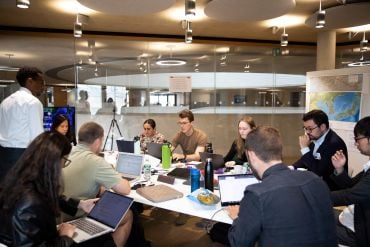
Teaching the World’s Future Leaders
As Oxford’s new academic year gets underway, we take a closer look at an award-winning teaching module that brings students face-to-face with real-world high-stakes decisions.
What would you do if there was a sudden nuclear threat from North Korea and you were responsible for deciding how your country responded? At Oxford University’s Blavatnik School of Government, Master of Public Policy (MPP) students tackle this challenge head-on in the 'North Korea Crisis Simulation' – an immersive teaching module that represents an innovative approach to teaching public policy.
The one-year postgraduate degree is designed to equip future leaders with practical skills for public policy practice. Its students come from around the world – last year hailing from 58 different countries and diverse backgrounds such as government, NGOs, journalism and academia.
The simulation, which was recognised earlier this year by the Vice-Chancellor’s ‘Innovative Teaching and Assessment’ Award, plunges the MPP students into a complex economic, political, and military crisis on the Korean peninsula; testing their ability to make high-stakes decisions, balance national priorities, manage security concerns, and collaborate with international partners under extreme pressure – all within a world marked by interconnected crises and rising geopolitical competition.
 Students assigned to the DPRK (North Korea) room developing strategy
Students assigned to the DPRK (North Korea) room developing strategyThe simulation is the brainchild of Professor Tom Simpson, who has first-hand experience of complex military situations, having served as an officer with the Royal Marine Commandos for five years. It incorporates elements of a ‘war game’, imitating a geopolitical crisis scenario where participants’ actions impact the options available to others.
This simulation challenges students to integrate theoretical knowledge with practical skills, pushing them to perform under high-stakes conditions.
It provides a deeply immersive experience that evolves based on their decisions, enhancing their understanding of national power dynamics. So our students are gaining invaluable insights into real-world policymaking and developing skills directly applicable to their future careers.
Professor Tom Simpson, Blavatnik School of Government
Split into six teams or countries – USA, China, Japan, Russia, South Korea, and North Korea – the students operate from meticulously designed ‘situation rooms’ complete with national flags, authentic snacks, and tailored props such as national seals on stationery, badges, and door plaques, as well as portraits of national leaders. The rooms are equipped with a bespoke communications suite, giving students the ability to receive recordings and live broadcasts from the dedicated Green Room.
In the weeks leading up to the simulation, MPP students receive detailed background briefings and in-depth reading assignments and research into the history of the crisis, the political, economic, and cultural characteristics of the countries in the region, and the national interests of the six countries involved. But it’s not until 24 hours before the exercise itself begins, when they are presented with confidential instructions, that they learn what their individual roles in the simulation will be. And then, at the start of the simulation, they finally learn about the crisis that is unfolding.
Aoife, a student from Northern Ireland who was assigned the role of the Chief of Staff to the President of the USA said: ‘I got to be a decision-maker at the epicentre of the simulation, which taught me a lot about teamwork, how to handle pressure, and the importance of maintaining focus on your ultimate goal.’
She also reflected on the challenges of working collaboratively in such a pressured environment: ‘It was really eye-opening to be thrown into a scenario where you have only limited information, there’s mistrust across teams, but the stakes are so high that you know you have to find a way of working together.’
 Students participating in the breaking news broadcast that concludes the simulation
Students participating in the breaking news broadcast that concludes the simulationWhile fictional, events in the simulation closely resemble real-world occurrences, such as the abduction of Japanese citizens by North Korea, financial turbulence, and gunfire in the Demilitarised Zone, to emphasise the complexities of real-world decision-making.
Erik, a Ukrainian MPP student, reflected: ‘The most valuable lessons were about teamwork under immense time pressure and responsibility; organising team efforts, balancing each member's involvement with the need to make quick decisions, effectively delegating tasks, and strategic action planning. I learned the importance of being ready to pursue moderate goals, as aiming for maximalist objectives can lead to counterproductive results.’
The award-winning ‘North Korea Crisis Simulation’ is one example of an immersive teaching method that has long been championed by the Blavatnik School’s Case Centre on Public Leadership, which develops teaching materials for public leaders at all career stages, thrusting them into the heart of a range of crises and challenges around the globe. The North Korea Crisis Simulation module has been made freely available for other schools of public policy to download here.
 What Louise Thompson’s campaign tells us about the national maternity crisis
What Louise Thompson’s campaign tells us about the national maternity crisis Celebrating 25 Years of Clarendon
Celebrating 25 Years of Clarendon  Learning for peace: global governance education at Oxford
Learning for peace: global governance education at Oxford  What US intervention could mean for displaced Venezuelans
What US intervention could mean for displaced Venezuelans  10 years on: The Oxford learning centre making an impact
10 years on: The Oxford learning centre making an impact Oxford and The Brilliant Club: inspiring the next generation of scholars
Oxford and The Brilliant Club: inspiring the next generation of scholars New course launched for the next generation of creative translators
New course launched for the next generation of creative translators The art of translation – raising the profile of languages in schools
The art of translation – raising the profile of languages in schools